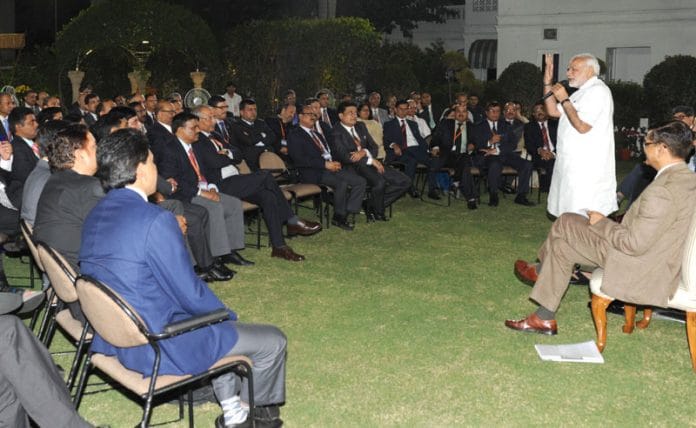New Delhi: Less than a month into his second term, Prime Minister Narendra Modi has set the agenda for his civil servants, tasking them with devising out-of-the-box ideas to transform governance within a fixed deadline.
Cabinet Secretary P.K. Sinha Monday reconstituted 10 sectoral groups of secretaries to finalise the five-year vision document for each ministry/department with annual sub-plans, timelines and milestones. The Modi government had first constituted the 10 groups of secretaries in 2016 for focused attention on key areas of governance.
The 10 groups will look into the following sectors: Rural and agriculture, infrastructure, resources, social, welfare, finance, economy, technology, governance and security, and foreign affairs.
Among other things, each of the groups has been asked to identify one or two big impactful decisions that each ministry/department can implement in the first 100 days of the government.
Sinha will hold his first meeting with the head of each group Tuesday afternoon.
Each group will be headed by a secretary and comprise between eight and 10 other secretaries as members. The groups have been asked to finalise their reports and presentations within a month.
Of the 10 groups, nine will have IAS officers, while one, the group on technology, will include scientists.
Also read: Goal to make India a $5 trillion economy by 2024 challenging but achievable: PM Modi
‘Outcome-oriented’
Civil Aviation Secretary Pradeep Singh Kharola is the convenor of the group on infrastructure, while Rural Development Secretary Amarjeet Sinha will head the group on rural and agriculture.
Power Secretary Ajay Kumar Bhalla will head the group on resources, Higher Education Secretary R. Subrahmanyam will lead the group on social sector, and Social Justice Secretary Nilam Sawhney, the group on welfare.
The group on finance will be headed by Financial Services Secretary Rajiv Kumar while Commerce Secretary Anup Wadhawan has been made the convener of the team on economy.
Information & Broadcasting Secretary Amit Khare has been made the convenor of the group on governance, while Defence Production Secretary Ajay Kumar will head the group on security and foreign affairs. Dr Renu Swaroop of the Department of Biotechnology will head the group on technology.
All the groups have been tasked with submitting a vision document that is “specific” , “measurable” and “outcome-oriented”.
Many of the recommendations of the first 10 groups of the previous Modi government were subsequently implemented, including to make Aadhaar a money bill and introducing cash transfers to buy food for pregnant and lactating mothers.
Also read: RBI to the rescue – Modi govt eyes bank’s Rs 9.6 trillion surplus to beat economy blues
This report has been updated to reflect that the 10 groups of secretaries were reconstituted Monday, not Tuesday.







First step to centralisation of power for an authoritative regime is reducule the relavency of elected executives in favor of appointed executives. There is no problem with creating such planning committees only problem is when the concerned minister is ignored.
Last mile connectivity and the reverse must be ensured. Governance is not just implementing the policy decisions, but must ensure that fruits reach the target in reality and not only on paper or on power point slides. There must exists a mechanism to receive the true feedback to the concerned head of the group along with a copy to PMO (to ensure corrective actions as per feedback).
The most crucial factors of governance at present being faced by common man are pertaining to the administrative concerns which is not being addressed by beurocratic hurdles and lack of control over the department’s.
Administrative governance must be priority before the Modi Government-2.
Each Minister, assisted by her MoSes, to whom she should delegate worthwhile work, should be the fulcrum of governance. That provides direction to the mandarins.
In some important states, ministers have lost their relevance. There is the CM and a group of “ trusted “ bureaucrats “. Not sure this model, which is not what the Constitution envisioned things to be, is delivering better governance and economic development.
The most crucial factors of governance at present being faced by common man are pertaining to the administrative concerns which is not being addressed by beurocratic hurdles and lack of control over the department’s.
Administrative governance must be priority before the Modi Government-2.